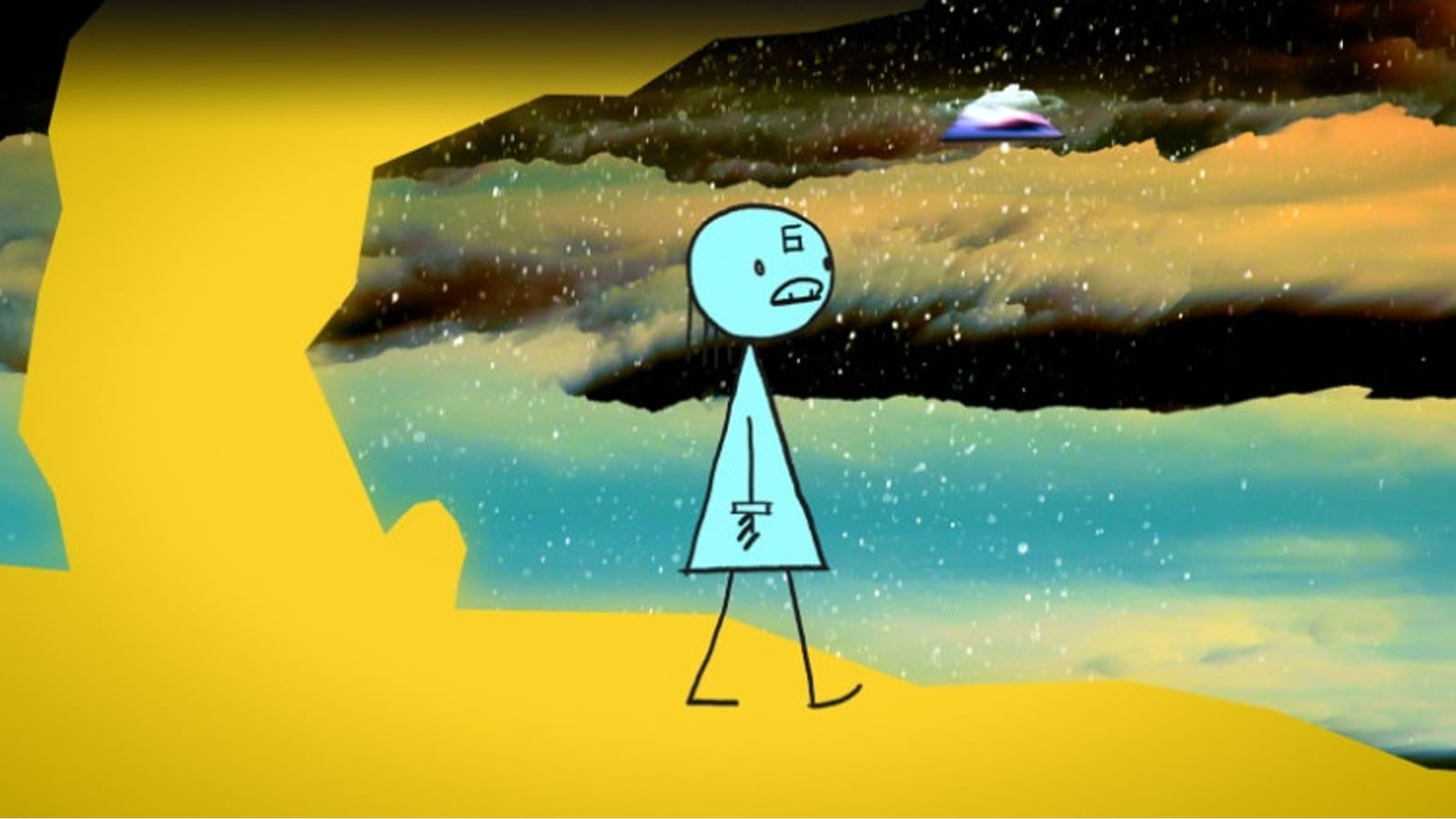It’s difficult to overstate the loveliness of Don Hertzfeldt’s work. This may seem like an odd thing to say about an artist whose first Oscar-nominated work, the animated short Rejected, featured a kernel of popcorn suffering anal bleeding and a group of silly-hat-wearers beating a man to death (among other grotesqueries), but there’s a delicacy even in that black humor and blood. And it’s deployed most clearly — and to the most devastating effect — in the animated shorts World of Tomorrow, nominated for an Oscar in 2016, and its follow-up this year, World of Tomorrow Episode Two: The Burden of Other People’s Thoughts.
Both World of Tomorrow and its sequel star a young girl named Emily (voiced by Hertzfeldt’s niece, Winona Mae) and an adult iteration of herself (voiced by Julia Pott), who dubs the girl “Emily Prime.” The grown-up Emily reveals herself to be a third-generation clone, explaining to Emily Prime that cloning has become commonplace in the future as a way of achieving immortality, though financial means play a large part in determining how effective a process this is. Some clones are created as living art pieces; others suffer deterioration as a result of being sourced from older generations.
The two travel through space and memory as the Emily clone relates her experiences in life and love. Their exchanges range from the comical (Winona Mae was four years old at the time of recording for the first film, and five when recording the second) to the inherently dark, but there’s a light that shines through the entirety of their conversation. Part of this is down to how candid Winona Mae is, and part of it is Hertzfeldt’s signature touch, as he navigates the vagaries of the future with a tenderness that’s rare in popular sci-fi — and popular culture as a whole. Take, for instance, the interlude in which the Emily clone speaks about experiencing grief. As a clone, she explains, she doesn’t have the mental or emotional capacity to process loss. “But sometimes, I sit in a chair late at night and quietly feel very bad,” she continues. “I am very proud of my sadness, because it means I am more alive.” Too often, we take that timbre of sadness as a curse, but doesn’t Emily have a point?
Besides being nominated for an Oscar, World of Tomorrow was ranked No. 10 in Rolling Stone’s list of “Greatest Animated Movies Ever,” and praised by the A.V. Club as being “possibly the best film of 2015.” It’s a testament to the film that these accolades are being bestowed upon seventeen minutes spent in the company of two stick figures, and World of Tomorrow Episode Two, which features Emily Prime and a different Emily clone, is no less of a wonder.
As with any sequel, there’s more going on in Episode Two. The Emily clone that Emily Prime meets this time is an incomplete backup copy, and slightly worse off for wear. That said, much like the first Emily clone we met, she is still looking for something that requires her to take Emily Prime on a metaphysical journey. This time around, there are more Emilys to encounter, and there’s even a dive into the mind of Emily Prime.
Like the first World of Tomorrow, Episode Two is scored by classical music, some of which is performed by Hertzfeldt himself. However, its use is much more cogent here. As the film progresses, the pieces used grow in the complexity of their arrangements, finally exploding into a rich embrace of sound that’s as cathartic as the tears a viewer will inevitably shed while watching the film.
The art in Episode Two is also more intricate than that of its predecessor. There’s nothing that defies the stick-figure construction of the Emilys (and that consistency is a feat in and of itself) but there’s still more. More, in the form of shattered memories that you can pick up and lick; more, in the form of little spheres of hope that have been discarded after becoming too painful to keep; more, in the form of a dreamscape that I found more transporting than almost anything else I’ve seen in a film this year. These are, obviously, not things that have any physical shape in real life, and yet they’re manifested here in a way that is so clear that they can’t really be questioned. And that’s all in a film that only runs just over 20 minutes.
On top of all that, despite its title and its premise, World of Tomorrow isn’t a series that’s necessarily about the future. The future figures in insomuch as death and remembrance play a dominant role in the narratives, and the series definitely boasts a sci-fi bent, but they’re all tomorrows that serve to emphasize just how important it is to appreciate today. In the words of the Emily clone in the first installment, “Now is the envy of all of the dead.”
Even if we weren’t as close as we are to the end of the year, I would feel confident in saying that World of Tomorrow Episode Two is one of the best films of 2017. The film makes a clear, unpretentious, and earnest argument for kindness to yourself and to others, and stands on its own in a year that has boasted an extraordinary number of films touching upon similar things.
There is one scene in particular in Episode Two that manages to sum up the series’ ethos in the space of just a second. From the first installment, we already have a sense of how well the Emily clones can (or rather, can’t) process emotions, and much as Emily Prime’s youth lends her dialogue purity, that disconnect gives the Emily clone an uncanny knack for expressing what is ultimately important, too. She tells Emily Prime about one of her “sisters,” since lost, and asks Emily Prime for a favor when she meets her in the future. “Tell her I’m glad we were both alive at the same time.”





